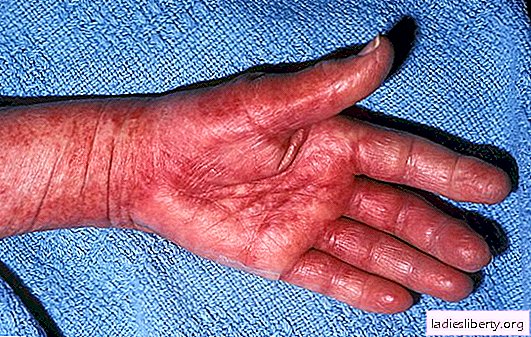
In a woman’s life there are special periods when taking care of one’s own health is especially important: pregnancy and lactation.
It is believed that vegetables must certainly be included in the diet of a healthy person. But are eggplants useful for a pregnant woman, for example?
Can eggplant be breastfed?
Useful properties of eggplant
The inclusion of a product in a person’s diet is explained not only by its taste, but primarily by its nutritional value and health benefits. Eggplant is not accidentally called the fruit of longevity.
Fruits with an unusual purple color really have unique properties. It is they that make it possible to best answer the question of whether eggplant can be used during pregnancy and breastfeeding.
• Due to the rich content of vitamins, micro and macro elements, pectin, plant fiber and unique substances, they have a beneficial effect on the cardiovascular system and protect the brain from destruction.
• Eggplants not only normalize the state of the nervous system, but also improve hematopoiesis, prevent inflammatory joint diseases, cleanse the intestines, and reduce the burden on the kidneys.
• One of the most unique properties of eggplant pulp is that it can prevent the development of cancer.
Of course, such a rich list of useful properties cannot be ignored. When thinking about whether it is possible to eggplant during pregnancy and breastfeeding, it is worth taking into account the increased load on the woman's body.
Yet in some cultures there is a tacit ban on the use of eggplant. For example, there is a belief that eggplant can provoke an abortion or the birth of a child with a pathology. Some peoples also negatively answer the question of whether eggplant can be breastfed.
Apparently, this refers to the potential danger of nightshade berries (and biologists classify eggplant that way) because of the toxic substance solanine contained in its peel. But the risk of poisoning with this poison is negligible, especially if before cooking you get rid of the peel, characteristic bitterness and do not use overripe eggplants for food.
Is eggplant possible during pregnancy
The body of a pregnant woman especially needs a vitamin-mineral complex. Eggplant is a storehouse of vitamins and minerals, but the benefits of "little blue" for expectant mothers are also in another.
Fiber and pectins help the intestines run smoothly, relieving constipation. In addition, not only toxins are excreted from the body. Due to fiber and pectins, the concentration of "bad" cholesterol is reduced, which prevents diseases of the liver, heart and blood vessels.
It is no secret that pregnant women often suffer from anemia. And eggplants are rich in manganese and copper, which are actively involved in hematopoiesis. The use of eggplant avoids the development of anemia, which is useful for the woman herself and for the health of the unborn baby.
No less important is the potassium contained in the eggplant pulp. Eggplant dishes reduce pressure, normalize kidney function, strengthen the heart, and relieve pregnant women from edema. Therefore, pregnant women suffering from hypertension and puffiness, not only can, but also need to include delicious eggplants in their nutrition plan. Edema will pass in a few days, the pressure will normalize.
Finally, folic acid, which is also found in eggplant, helps to properly form the fetal nervous system without pathology. In addition, it is this substance that ensures the normal development of the placenta.
As for the poisonous solanine, it is concentrated mainly in the purple skin. The older the fetus, the more toxin he managed to accumulate. Therefore, on the table of a pregnant woman there should be young eggplants, from which, for the sake of their own calm, you need to cut the skin.
The most useful for the expectant mother baked fruits. They retain more vitamins than in a boiled product. In addition, during baking, the characteristic bitterness of eggplant pulp disappears.
But nutritionists do not advise pregnant women to fry eggplant. The dish will turn out too fat and heavy, complicate the digestive process, create a feeling of heaviness in the stomach. Instead of baking, you can use steaming or frying in a grill pan without oil.
Is it possible to eat eggplant for nursing mother
After the birth of a baby, the mother’s body no less needs vitamins, minerals, fiber and other useful substances contained in eggplant pulp.
In this sense, the question of whether eggplant can be breastfed, gynecologists and therapists respond positively. And that's why:
• magnesium and potassium strengthen the heart muscle;
• iodine protects the thyroid gland;
• fluorine and phosphorus will help to cope with a decrease in bone density. Often, women are faced with the fact that after childbirth, teeth begin to deteriorate. By incorporating eggplant into your diet, young mothers will help the body recover;
• due to the nicotinic acid contained in the purple fruits, the brain will work better;
• B vitamins will help cope with postpartum depression;
• support the body and ascorbic acid, and iron, and zinc.
Many mothers are concerned about weight gain during childbearing and the postpartum period. Eggplants, having a low calorie content, help to get rid not only of excess water, but also of fat deposits. Due to fiber, the intestines will be well, regularly, and most importantly, naturally cleaned.
In general, when asked whether eggplant can be used during pregnancy and breastfeeding, both gynecologists and nutritionists give a positive answer. However, it is important to understand the negative and dangerous moments for the baby:
• the newborn may be allergic to the substances contained in the eggplant;
• the baby’s intestines are still immature, so heavy food that the mother eats can cause intestinal colic, diarrhea;
• eating large amounts of old, overripe fruits and peels is potentially dangerous due to the accumulation of solanine.
All the food that a nursing mother eats is also received by the newborn. That is why a woman is obliged to draw up her diet in such a way as to minimize the risk for the immature intestinal and immune systems of the infant.
If the mother ate a purple berry during pregnancy, then after giving birth there is no reason to be afraid of the development of an allergy to it. The question of whether eggplant can be given to nursing mothers is resolved positively. But this situation does not apply to the baby’s body: it may just react negatively to the product.
How is the reaction manifested? Differently. A mother who, for the first time after giving birth, has tried an eggplant dish, should monitor the condition of the baby, monitoring all signs of trouble:
• colic, anxiety, crying;
• stool disorder, increased gas formation;
• the appearance on the skin of red spots, bumps resembling mosquito bites (this is hives), abnormal pallor, weakness.
It is important to remember that an allergic reaction can occur immediately after an allergen enters the body or be delayed. Negative changes in the state of both mother and baby can appear 2-3 days after eating an allergenic dish. It is difficult to guess what exactly caused the allergy in this case, especially if several different dishes appeared in the diet during this time.
So is it possible to eggplant nursing mother? It is possible, but with caution and in small quantities. In addition, young fruits must be selected for consumption. The general rules for including purple berries in the nutrition plan are as follows:
• buy "little blue ones" only in the store or eat vegetables from your garden;
• "winter" eggplant, even in large stores, is better not to buy, as they are probably processed by agricultural chemistry;
• use young, medium-sized fruits for food;
• carefully select the "little blue ones", do not eat fruits with rotten rotten skin;
• introduce eggplant into the diet gradually and in small portions.
Is it possible for the nursing mother to eggplant, not immediately after eating berries and vegetables. In the first month after the birth of crumbs, it is better to experiment with food altogether and be especially careful with fruits, vegetables and berries.
The patronage sister will surely tell you how this or that product acts on the intestines of the newborn.
But after 3-4 weeks you can try eggplant dishes, as at this time the baby’s adaptation to the new conditions has already taken place. First, mom should eat a very small, purely symbolic portion. If nothing bad happened with the newborn, then after 4-5 days you can repeat the experiment.
If a negative reaction occurs, the use of eggplant dishes should be discarded. As soon as the baby’s condition is normalized (they stop tormenting the gaziki, the stool normalizes), you can again try to introduce “blue” women into the diet. If the reaction repeats, then the question of whether eggplant can be given to a nursing mother no longer makes sense. You can’t eat them before the end of the period of breastfeeding.
Harmful Eggplant
The main danger of using eggplant, in addition to a possible allergy, is the accumulation of solanine poison. If you eat a lot of overripe fruits with a black, rough skin, then the consequences can be disastrous. Signs of toxin solanine poisoning include dizziness, vomiting, diarrhea, colic, and even cramping.
Is it possible to have eggplant during pregnancy and lactation, also depends on the presence of concomitant chronic diseases in the mother. With a tendency to form kidney stones, eating "blue ones" is not worth it. Salts of oxalic acid, which are formed in the human body after eating eggplant, stimulate the development of the pathological process.
Pregnant and lactating women should not eat eggplant in acute gastritis, ulcers, pancreatitis, diarrhea.











